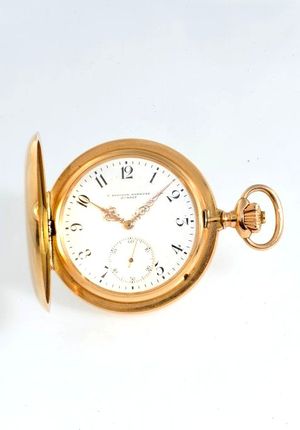Dencker, Ferdinand/en
Dencker, Ferdinand

Savonnette in "Qualität Extra"-Ausführung
German chronometer maker Ferdinand Dencker was born 1837 in Lütjenburg, Schleswig-Holstein.
Dencker went to Hamburg in 1866 and opened a workshop for making marine chronometers and precision pendulum clocks, his ambition being the minimisation of the so-called middle temperature error. Around 1870 he worked in cooperation with maker Theodor Knoblich for a short while; Dencker also worked with Jean Moïse Badollet and Charles Henri Meylan in Le Brassus in Switzerland, from where he purchased movements and cases. Between 1903 and 1905 Dencker successfully took part in the chronometer tests at the German naval observatory in Hamburg and was called in as expert by the observatory on several occasions.
On October 6, 1905, Dencker founded the company "Hamburger Chronometerwerke GmbH" together with six shipping company owners from Hamburg and Bremen. He was initially director and principal regleur of the chronometer making company which had its premises at "Neue Gröninger Strasse 22-24" in Hamburg.
The company’s target was the annual production of 240 chronometers and 500 marine chronometers; hence Walter Prell was brought into the company. In late 1907 disagreements between Dencker and the other partners began to surface; Dencker left the company in 1908 and was replaced by William Maier. As a matter of fact, the target of 240 chronometers per year was never reached - it is possible that Dencker deliberately aimed high when the company was founded.
At the Berlin trade exhibition Dencker displayed several marine chronometers and a model of the middle temperature error compensation he had invented; he also exhibited his seconds pendulum clocks, some of which had detached escapements and were "running in a vacuum without train or oil". Dencker supplied the master clock for the royal geodesic institute in Potsdam.
Dencker began to focus again on his own manufacture and managed his company until his death in 1917.